
by Melanie Taylor | Aug 28, 2024
School is back in session. The long days of summer and not following a schedule have come to an end. It is important to help your child/teenager get back on a regular schedule and into a normal sleep routine.
Busy lifestyles filled with school, afterschool, and evening activities have become the norm in the American culture. But these demanding hours of multi-tasking are negatively affecting many of our daily lives. If it affects us as adults, what must it be doing to our children and teens? Overlooking the importance of sleep is damaging to our mental, physical, and cognitive health.
Sleep is a crucial biological function. It plays a significant role in restoring and recovering the body systems, improving learning and memory, and healthy brain development.

(Photo source: Adobe Stock)
Sleep deprivation can lead to physical and behavioral symptoms that can be misdiagnosed as more severe mental and behavioral disorders. Children who do not get enough sleep may not physically appear to be sleepy. However, they may struggle with attentiveness, hyperactivity, aggression, or disruptive behavior. Sleep deprivation also reduces the immune system’s ability to defend against colds and the flu.
Tips for good sleep habits for children and families include:
- Make sleep a respected priority.
Establish a consistent, relaxing bedtime routine.
- Consistency is key for regular daytime and bedtime routines for sleep.
Attempt to maintain a regular sleep and wake schedule, including on weekends.
- Provide children with positive attention before bedtime.
This may reduce conflict or resistance to bedtime routines.
- Keep bedrooms dark, cool, and quiet.
Do not have a TV, computer, or cellphone in the room.
- Use the bed only for sleep.
Avoid reading or doing homework in bed. Remove activities from the sleep environment that may be stimulating, such as devices with screens and video games.
- Avoid caffeine in the late afternoon and evening, or for a minimum of three hours before bed.
- Encourage children to sleep in their beds.
It helps them learn to fall asleep independently. Parents also need uninterrupted sleep.
The National Sleep Institute recommends these hours of sleep for different age groups:
- 12–17 hours for newborns and infants
- 11–14 hours for ages 1–2
- 10–13 hours for ages 3–5
- 9–11 hours for ages 6–13
- 8–10 hours for ages 14–17
- 7–9 hours for adults
As the school year begins, help your children get a strong start by guiding them through healthy sleep habits. Restful sleep will prepare them for school days with fun-filled learning experiences.
If you have concerns about your child’s sleep patterns, etc. be sure to reach out to your child’s physician or a mental health professional to help them learn good sleep habits for a successful future.
Source: Mayo Clinic Health System – https://www.mayoclinichealthsystem.org/
An Equal Opportunity Institution.

by Gretchen Thornton | Jan 13, 2022
The Art of Effective Communication
SMART Couples Florida Celebration
Statewide Virtual Event
February 19, 2022
6:00 – 9:15 p.m. EST

Photo source: Victor Harris
It’s time to talk about love! Join us online for a night of real talk about building stronger relationships from marriage and family professionals across the nation. Learn how to improve your communication and keep the romance alive. Tickets available now!
Learn more here: https://smartcouples.ifas.ufl.edu/flcelebration/

by Melanie Taylor | Sep 29, 2021
Until July 2, 2021, I felt confident I had done everything possible to stay safe and avoid contracting Covid-19. Throughout 2020 and well into 2021, I worked from home, socialized very little, quarantined when necessary, wore my mask, and constantly washed my hands. In fact, I may have dry skin on my hands for the rest of my life, but I still wash my hands frequently. The Covid-19 virus has become a controversial issue over the past two years, but my story is from real experience.
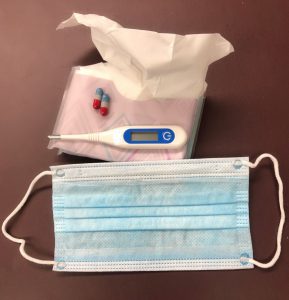
Keeping your fever under control is a necessity when battling Covid-19. Photo credit: Melanie Taylor
As I prepared to have a safe, but fun, Fourth of July weekend with a few vaccinated friends, I was winding down my Friday at work and started to feel achy. I headed home, excited for a 3-day weekend, but I still felt like I was dragging. My husband and I had plans to meet up with friends at a restaurant with outdoor seating, but before I left the house, I decided to take my temperature, just to be cautious. To our surprise, I had a fever of 99.9. We canceled our dinner plans and I took some acetaminophen, went to bed early, and we prayed it was not Covid-19. It was kind of an unspoken prayer because neither of us wanted to admit we were a little nervous about my symptoms. As the weekend carried on, I felt sicker as the hours and days went by and barely left the sofa or bed. On Sunday morning, I woke up with a bad dry, hard cough so my husband called my doctor. To be totally transparent, I am immunocompromised, so we both knew there was a chance I could have a breakthrough case even though I was vaccinated. Based on my symptoms, my doctor recommended I go to the emergency room and be evaluated since it was a 3-day weekend. I followed his directions, had a chest x-ray, which, thankfully, was clear, but I tested positive for Covid-19.
Let me honestly say, this was the sickest I had ever felt in my memories. For about twelve straight days, I laid on the sofa, took my temperature and oxygen levels, had no sense of taste or smell, ate food with no taste to keep up my strength, hydrated, and slept. The body aches, fever, dry cough, and fatigue were debilitating. I had every Covid-19 symptom listed by the CDC except for a headache. I thought to myself many times how bad and scary this could have been if I had not been vaccinated. My doctor clearly expressed his opinion that if I had been unvaccinated, I would have been hospitalized, no questions asked. Unlike many people, it was not recommended for me to take a regimen of pills or vitamins, so I fought it with acetaminophen, lots of hydration, healthy foods, and tons of rest. When I finally woke up on July 14th and could smell the coffee brewing, I knew the end was finally in sight. It still took two more weeks to feel and return to normal, and I knew firsthand this virus is no joke.
Like many of you, I know people that have tested positive and showed no symptoms, some that felt very sick but were able to stay home and recover, and some that never made it home from the hospital. I work in the field of science as a UF/IFAS Extension Agent and feel very strongly that we can all make simple efforts to reduce exposure to ourselves and others. The most important step is to pay attention to the symptoms and stay home if we suspect illness or exposure. Even though I was looking forward to the holiday festivities, I made a conscious decision to stay home on July 2nd just in case I really was positive with Covid-19. I wanted to keep my friends and family safe just in case there was a remote chance I was contagious. I feel very grateful I did not expose them to this virus.
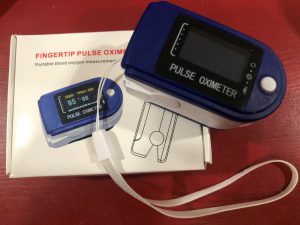
Checking your oxygen levels while sick with Covid-19 is a must. Photo credit: Melanie Taylor
The positive cases in Florida are lower right now, and that is fantastic. I am very excited about it too, but I also know we still shouldn’t put our guard down. Please stay aware. Be aware if you or a family member(s) have been exposed or do not feel well, and check for symptoms. I highly recommend every American household have a reliable thermometer, a pulse oximeter (safe oxygen levels should not go lower than 92), fluids for hydration, and foods of different textures because eating food without being able to taste and smell is very difficult. Different food temperatures, spice levels, and textures made eating to keep up my strength easier for me to handle.
The past two years have been stressful, emotional, and very exhausting. We still cannot forget to stay aware and diligent in our everyday lives to keep our families, friends, and communities healthy. Please revisit these CDC websites as needed and always consult your doctor when you have questions and concerns. Stay aware and healthy out there!
https://www.cdc.gov/coronavirus/2019-ncov/your-health/index.html\
https://www.cdc.gov/coronavirus/2019-ncov/symptoms-testing/symptoms.html
https://www.cdc.gov/coronavirus/2019-ncov/prevent-getting-sick/index.html
https://www.cdc.gov/coronavirus/2019-ncov/testing/index.html
https://www.cdc.gov/coronavirus/2019-ncov/if-you-are-sick/index.html
https://www.cdc.gov/coronavirus/2019-ncov/need-extra-precautions/people-with-medical-conditions.html

by Melanie Taylor | Jul 9, 2021
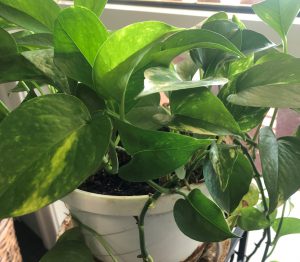
Some house plants are very easy to keep alive, even if you are a first-time gardener. Photo source: Melanie Taylor
As July begins, one mental health topic we repeatedly hear or read about is how stress is negatively affecting so many Americans right now. In these unprecedented times, many people are reaching out for guidance from their doctors, therapists, friends, and family. Depending on how your stress levels are affecting you, there are numerous suggestions ranging from exercise to therapy to medication and the list goes on. There may be one solution right at your fingertips that can help you begin to find a little peace of mind starting today. Gardening…. Let’s DIG IN!
Gardening does not have to be growing a large vegetable garden in the backyard. It can be planting flowers and plants in your landscape, maintaining potted plants on your front porch and deck, or growing houseplants inside your home. One easy way to start if you have never been a gardener is by growing herbs inside or out. Many people find gardening helps them escape to a place of peace as they dig in the soil and watch their plants and flowers grow and prosper.
This idea is not new. Horticulture is the art and science of growing plants. Horticultural therapy is the practice of engaging people in plant or gardening activities to improve their bodies, minds, and spirits. Research confirms that healthful benefits accrue when people connect with nature and plants by viewing and/or interacting with them.
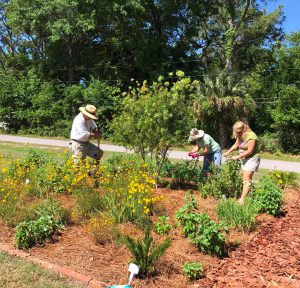
Enjoy socializing with friends and neighbors in the garden. Photo source: Julie McConnell
Horticultural therapy has been around for a very long time. In the 1600’s, the poor often worked in gardens to pay for their medical care. Physicians quickly noticed these patients recovered faster and had better overall health than patients who did not work in the garden. Today, many hospitals, long-term care facilities, rehabilitation centers, prisons, schools, social-service facilities, and community centers use people-plant interactions as a form of treatment for persons with physical or mental disabilities. Horticultural therapy may include meeting with a therapist specializing in this area or trying something on your own or with family, friends, or a local gardening group.
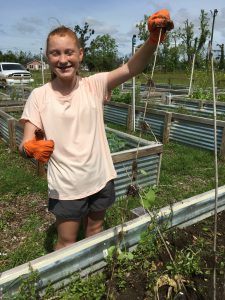
Saturday mornings are family time at the local community garden plot. Photo source: Julie McConnell
Some benefits you may receive from gardening include:
- Physical: Provides exercise at various levels. (Easy, medium, and strenuous levels – it all depends on what you decide to create.)
- Emotional: Promotes and satisfies your creative side, increases your feelings of confidence and self-esteem, promotes a new interest and enthusiasm for it, and even relieves tension.
- Physiological: May help lower blood pressure and heart rate, decrease cortisol levels, and ultimately relieve stress.
Even if you think you do not have a “green thumb,” you should try gardening on any level and see if it will be a healthy mode of stress release for you. Happy Gardening!
Source:
UF/IFAS Extension EDIS Document ENH970: Horticultural Therapy, Elizabeth Diehl and Sydney Park Brown.

by Laurie Osgood | Jun 15, 2020

Photo Source: Laurie Osgood
With everything going on in the world today, it could be easy to forget one of the most important holidays of the year, Father’s Day. We will celebrate Father’s Day on June 21st this year, during Men’s Health Month! Father’s Day is a good time to show the men in our lives that we want them to be with us for a long time. Let’s celebrate Men’s Health Month by encouraging the men in our lives to adopt healthy habits and seek regular medical advice.
Most men do not like to go the doctor. A 2014 survey conducted by The Centers for Disease Control (CDC) determined that American men are much less likely to go to the doctor than women. Starting a conversation could encourage him to pay attention to his health as he ages. But how do we start the conversation with our father’s about their health issues? To ensure a stress-free conversation, pick a time and place with few distractions and present the topic in a loving and non-judgmental manner.
Here Are the Top Healthy Living Tips for Men:
- Schedule an annual physical exam: Annual physical exams can help spot potential problems before they get serious. Only you and your doctor can determine your best checkup and screening schedule. Preventative screenings such as an annual colonoscopy are based on a patient’s age and risk factors for developing a condition or disease, including family or personal history, age, ethnicity, and environmental exposure.
- Recognize the Signs and Symptoms of a Heart Attack: According to the American Heart Association, someone in the U.S. has a heart attack every 40 seconds. Therefore it is important for everyone to recognize the signs of a heart attack. These warning signs include pain or discomfort in the jaw, chest, arms, shoulders, neck, or back, feeling light-headed or weak and shortness of breath.
- Make sleep a priority: Many adults don’t get enough sleep. Sleep is essential for our bodies to maintain our healthy bodily functions. Sleep disorders and ongoing lack of sleep can increase the risk of heart disease, high blood pressure, stroke, and diabetes.
- Reduce Stress: High levels of stress can negatively affect a man’s lifestyle. Stress can be life threatening and can lead to a heart attack. UF/IFAS Extension’s Electronic Data Information Source (EDIS) offers a collection of information on various subjects including how to manage stress.
- Stop Smoking: Men who smoke are at a greater risk for heart disease, cancer, respiratory diseases and strokes. Quitting can help lower the risk for smoking-related illnesses. The Florida Department of Health’s Tobacco Free Florida campaign offers resources to help quit tobacco use.
- Exercise More: Regular workouts can improve heart health as well as reduce stress and weight. Experts tell us that we should all try to get at least 30 minutes of moderate physical activity each day to maintain a healthy lifestyle.
- Eat Healthy: A healthy diet should include a variety of fruits and vegetables, whole grains, lean meats, and low-fat dairy products daily. USDA offers tips for Men’s Health; 10 Tips: Get the Facts to Feel and Look Better .
Father’s Day is a great time to celebrate the men in our lives and encourage them to pay attention to their health and well-being because we want them to be around for a long time.
Going to the doctor may not be as fun as going to a ballgame or the beach, but having a conversation about their health may be the gift we can give our fathers on Father’s Day.
For more information on healthy living or other extension related topics, contact your local UF/IFAS Extension Agent.
Extension classes are open to everyone regardless of race, creed, color, religion, age, disability, sex, sexual orientation, marital status, national origin, political opinions or affiliations.













